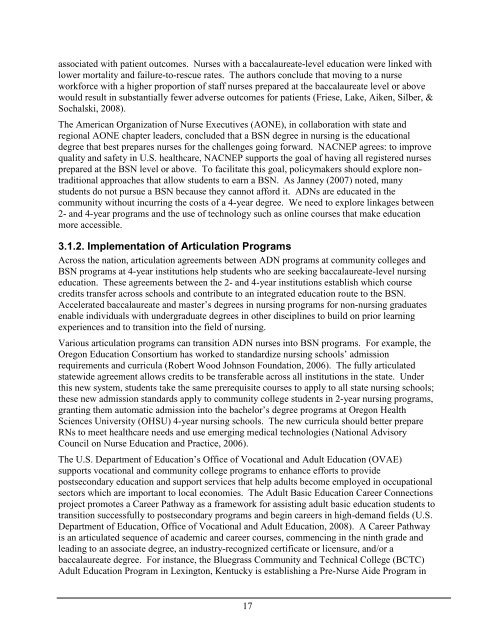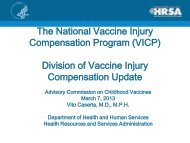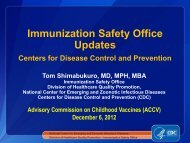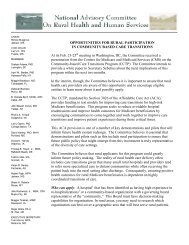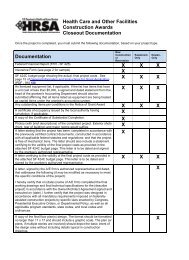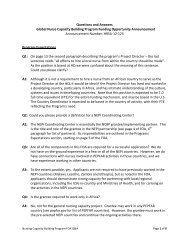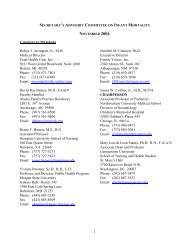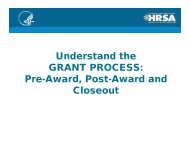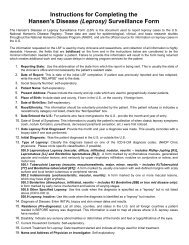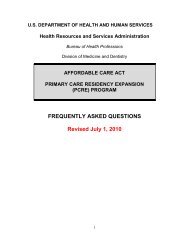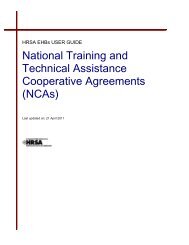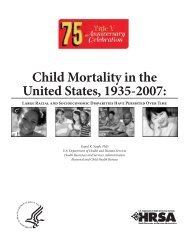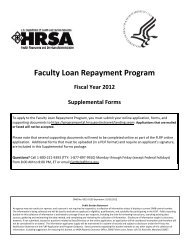Addressing New Challenges Facing Nursing Education ... - HRSA
Addressing New Challenges Facing Nursing Education ... - HRSA
Addressing New Challenges Facing Nursing Education ... - HRSA
You also want an ePaper? Increase the reach of your titles
YUMPU automatically turns print PDFs into web optimized ePapers that Google loves.
associated with patient outcomes. Nurses with a baccalaureate-level education were linked with<br />
lower mortality and failure-to-rescue rates. The authors conclude that moving to a nurse<br />
workforce with a higher proportion of staff nurses prepared at the baccalaureate level or above<br />
would result in substantially fewer adverse outcomes for patients (Friese, Lake, Aiken, Silber, &<br />
Sochalski, 2008).<br />
The American Organization of Nurse Executives (AONE), in collaboration with state and<br />
regional AONE chapter leaders, concluded that a BSN degree in nursing is the educational<br />
degree that best prepares nurses for the challenges going forward. NACNEP agrees: to improve<br />
quality and safety in U.S. healthcare, NACNEP supports the goal of having all registered nurses<br />
prepared at the BSN level or above. To facilitate this goal, policymakers should explore nontraditional<br />
approaches that allow students to earn a BSN. As Janney (2007) noted, many<br />
students do not pursue a BSN because they cannot afford it. ADNs are educated in the<br />
community without incurring the costs of a 4-year degree. We need to explore linkages between<br />
2- and 4-year programs and the use of technology such as online courses that make education<br />
more accessible.<br />
3.1.2. Implementation of Articulation Programs<br />
Across the nation, articulation agreements between ADN programs at community colleges and<br />
BSN programs at 4-year institutions help students who are seeking baccalaureate-level nursing<br />
education. These agreements between the 2- and 4-year institutions establish which course<br />
credits transfer across schools and contribute to an integrated education route to the BSN.<br />
Accelerated baccalaureate and master’s degrees in nursing programs for non-nursing graduates<br />
enable individuals with undergraduate degrees in other disciplines to build on prior learning<br />
experiences and to transition into the field of nursing.<br />
Various articulation programs can transition ADN nurses into BSN programs. For example, the<br />
Oregon <strong>Education</strong> Consortium has worked to standardize nursing schools’ admission<br />
requirements and curricula (Robert Wood Johnson Foundation, 2006). The fully articulated<br />
statewide agreement allows credits to be transferable across all institutions in the state. Under<br />
this new system, students take the same prerequisite courses to apply to all state nursing schools;<br />
these new admission standards apply to community college students in 2-year nursing programs,<br />
granting them automatic admission into the bachelor’s degree programs at Oregon Health<br />
Sciences University (OHSU) 4-year nursing schools. The new curricula should better prepare<br />
RNs to meet healthcare needs and use emerging medical technologies (National Advisory<br />
Council on Nurse <strong>Education</strong> and Practice, 2006).<br />
The U.S. Department of <strong>Education</strong>’s Office of Vocational and Adult <strong>Education</strong> (OVAE)<br />
supports vocational and community college programs to enhance efforts to provide<br />
postsecondary education and support services that help adults become employed in occupational<br />
sectors which are important to local economies. The Adult Basic <strong>Education</strong> Career Connections<br />
project promotes a Career Pathway as a framework for assisting adult basic education students to<br />
transition successfully to postsecondary programs and begin careers in high-demand fields (U.S.<br />
Department of <strong>Education</strong>, Office of Vocational and Adult <strong>Education</strong>, 2008). A Career Pathway<br />
is an articulated sequence of academic and career courses, commencing in the ninth grade and<br />
leading to an associate degree, an industry-recognized certificate or licensure, and/or a<br />
baccalaureate degree. For instance, the Bluegrass Community and Technical College (BCTC)<br />
Adult <strong>Education</strong> Program in Lexington, Kentucky is establishing a Pre-Nurse Aide Program in<br />
17


